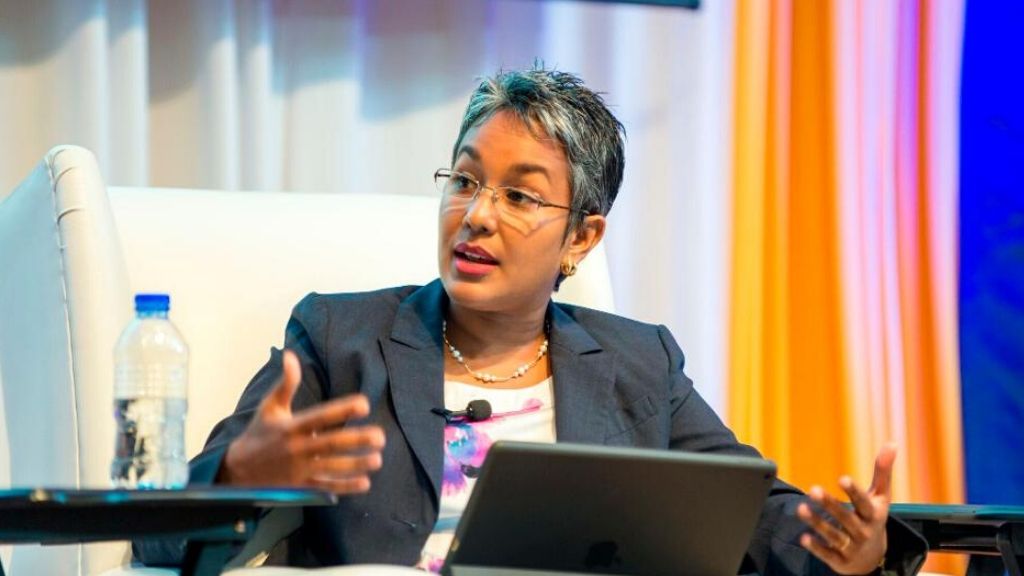by Marlon Madden
Regional Economic Advisor Marla Dukharan says there are many upsides to Barbados and other Caribbean Community (CARICOM) states trading in their local currencies.
In fact, she said achieving this would help to drive growth and development in regional economies by unlocking investments and lowering export costs, adding that it could be done using digital currencies.
Dukharan was referring to a recent suggestion by Prime Minister Mia Mottley that a CARICOM Multilateral Clearing Facility (CMCF) that would not require US currency could soon be reestablished.
Mottley was speaking during a brief ceremony to sign a memorandum of understanding (MOU) with the African Export-Import Bank (Afreximbank) to deepen trade and investment cooperation between CARICOM and the Africa Union.
“We have maintained for some time, that even though the CARICOM Multilateral Clearing Facility failed 30 years ago, there is no reason for it to fail today if we plan it out properly and can work out what the commitments and the opportunities are.
“Our biggest trading partner in Barbados is in fact with Trinidad. Why should we be paying for goods in Trinidad in hard currency of US dollars and vice versa? So we need to see how best we can work together and leverage that,” said Mottley.
Dukharan, speaking during an UNCTAD15 side event on Friday, said having this system in place would eliminate the need for a number of requirements that currently exist.
“I don’t know there are any cons. To me, there is only upside to the governments, the central banks and the private sector,” said Dukharan in response to a question about the planned system.
“I think what the Prime Minister is trying to get at here is the fact that when we pay and settle financial transactions for intraregional trade, for example, if a farmer in St Vincent is selling produce to Trinidad the buyer in Trinidad is supposed to buy US dollar from the bank and wire it. That assumes many things
“It assumes that on both sides these individuals or entities are banked, it assumes the availability of foreign exchange, it assumes correspondent banking relationships where the banks can easily clear US dollars through the international banking system and move that money from the bankers in Trinidad to the bankers in St Vincent,” explained Dukharan.
However, she said “all of these assumptions are not always met. We have in some countries financial inclusion that is well below 50 per cent. We have some banks in the region that do not have adequate correspondent relationships. We have countries in this region that do not have adequate levels of foreign exchange reserves”.
The economist said the leaders of the day did recognise this as a challenge back in the 1970s, and that was the reason for the creation of the CMCF for the intraregional trade without the use of US dollars.
The CMCF, which came to an end in 1983, was a centralised payments clearing and settlement accounting system that allowed CARICOM member states to use their local currencies to settle transactions.
Dukharan said: “that system fell apart when Guyana defaulted in the early 1980s and there has been a new system that has been envisioned for the Caribbean settlement network were we don’t rely on a credit system, where we rely on a currency swap type arrangement, specifically with digital currencies so that you don’t have to move physical currency and you don’t have to use the international banking system to send wire transfers”.
“This is a system that has been envisaged and the details of which have been worked out via a network of professionals in the digital currency space and central banking space and the private sector conglomerate pan-regional organisational space including multilaterals,” she disclosed.
She said officials were currently waiting for the leadership of CARICOM and the regional central banks of “to agree to take the next step and do a pilot with his network”.
She explained that once this was done and the kinks were ironed out and legal framework and arrangements put in place it would be implemented across CARICOM.
Dukharan said it could then be extended to include countries that were not within the 15-member bloc such as the Dutch and French territories, the Dominican Republic, Haiti and Cuba.
“You can even take it beyond the region to other areas, most importantly, the global south. I know we are trying to forge closer relationships with African countries for example, and they are in Africa actually working on a similar network themselves.
“So we can connect ours with theirs. We would need to rely much less on the US dollar and much less on the very expensive, cumbersome international financial system to move money,” she said.
marlonmadden@barbadostoday.bb




